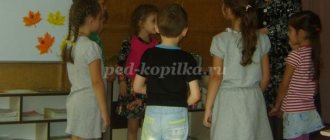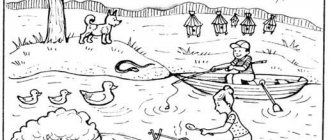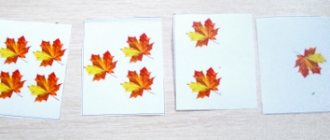Summary of a speech therapy lesson on the topic “Transport”
Summary of a speech therapy lesson in a preparatory group on teaching literacy and developing coherent speech
Topic: "Transport"
Goals:
- clarification and consolidation of knowledge on the lexical topic “Transport”.
- improving the practical use of qualitative adjectives.
- formation of word-formation skills based on exercises in the formation of relative adjectives; in the analysis of words of complex syllabic structure.
- development of coherent speech based on exercises in retelling texts with a cause-and-effect relationship and relying on subject pictures and questions.
- development of attention, memory, visual perception, logical thinking based on exercises in analysis, synthesis, classification, elimination.
Equipment: board, typesetting canvas, bibabo doll Kolobok, pictures-symbols of various types of transport, subject pictures depicting various types of transport, reference pictures for working on the retelling, red and blue hoops, teaching aid “Palette”.
Progress of the lesson:
1. Organizational point:
Standing in a circle, children join hands. Everyone says a few kind words to their neighbor, praises, supports, and reassures. Thank each other for understanding and support. Speech therapist: - Guys, I suggest you go on a journey through a fairy tale. Tell me, what can you use in a fairy tale: - to sail? (on a boat, on a ship...) - fly? (by plane, by helicopter, by hot air balloon...) - go? (by car, by bicycle, by train...) - how would you like to travel through the fairy tale? (children's answers, general choice).
2. Introduction to the topic of the lesson:
Speech therapist: - What can you call a train, a ship, a car? (transport) Name the transport that: - moves only on water (water); - moves only by air (airborne); - transports goods (cargo); -carries passengers (passenger); -moves only by rail (railroad)? Each child is offered a picture depicting one or another type of transport. Picture symbols are displayed on the board, indicating different types of transport (see equipment). Task: find the “house” in the picture.
3. Main part of the lesson:
Speech therapist: - So, today we will travel through a fairy tale, the main character of which is Kolobok. He hurries to tell us something: Kolobok (speech therapist): - One evening I was rolling along the path. Out of boredom I started counting the stars in the sky. Suddenly I see another Kolobok rolling across the sky. I didn’t recognize him and asked: “Who are you?” The heavenly Kolobok is silent. I wanted to get to know each other better, and the heavenly Kolobok came from me.
I’m swinging, I’m in a hurry, and a FIRE HORSE meets me. I began to ask the FIRE HORSE to help me catch up with the heavenly Kolobok, and the FIRE HORSE answered: “Fulfill my tasks, and I will help you.” Children help Kolobok tell what kind of HORSE IS FIRE (beautiful, kind, strong, swift, fire-maned, etc.). Children draw with markers on the board the path of the FIRE HORSE as he gallops quickly; thoughtfully; sad; fun, cheerful.
Kolobok: - I sat on the HORSE-FIRE, but we could not catch up with Kolobok in the sky. I sadly rolled on and then a CAR met me - a FAST TIRE. I asked her for help. CAR - FAST TIRE answers: “Help me, and I won’t be in debt!” Children, together with CAR - FAST TIRE: - correct the mistake in the word car, while reinforcing the rules for writing SHI, ZHI. — make up sentences with the word CAR according to given patterns (sentences of 2, 3, 4 words). - choose the correct sentence:
1) The car stopped because it ran out of gas. 2) The gas ran out because the car stopped. - answer the questions: a) Before getting on the train, I bought a ticket. What did I do first? b) After the traffic light turned green, the pedestrian crossed the street. What did the pedestrian do first?
When the CAR - FAST TIRE drives away, children are asked to remember which of the passengers was sitting first, last, behind the wheel of the car. Kolobok: - Unfortunately, the CAR - FAST TIRE could not help me either. I rolled further, and towards me was a STEAM LOGO - HUNDRED WHEELS. I also began to ask him for help. THE STEAM LOGO – A HUNDRED WHEELS answers: “If you help me, I’ll help you!” Children are asked to identify and name the parts of the locomotive. Then a subgroup of children receives parts of the locomotive and lays out (repairs) the locomotive on a flannelgraph from memory. The second subgroup of children completes the task of finding parts of a steam locomotive. /educational game “Palette”/
Everyone is invited to lay out the sound diagram of the word STEAM LOZO using hoops of the desired color. Kolobok: - I sat down on the STEAM LOGO, the wheels began to rattle, but again I couldn’t catch up with the other Kolobok... I rolled further along the sad path and suddenly I saw a PLANE in the sky - a FAST FLYER. I turned to him for help. PLANE - FAST FLIGHT replies: “Help me first!”
Helping Kolobok and FAST PLANE, the children explain what words make up the word PLANE, HELICOPTER, LUNOKHOD, SCOOTER. — I boarded a FAST PLANE and we flew off to catch up with the heavenly Kolobok. Only the Heavenly Kolobok is ahead again. Here the PLANE is a FAST FLYER and says: “I can’t catch up with him, maybe the ROCKET will help you?” I rolled towards the ROCKET, and she also prepared a task for me: “I’ll help you if you find and tell me what parts I’m made of!” -Children name the letters - the parts of the ROCKET, find them in the magnetic alphabet and make words from the letters. Kolobok: - A ROCKET took off... and then I noticed that the night was over, and the heavenly Kolobok had completely disappeared. That's the end of the fairy tale!
4. Consolidation of acquired knowledge.
Speech therapist: - Did you guess which Kolobok was rolling across the sky? Who helped our Kolobok catch up with the stranger? Children name all the heroes of the fairy tale, and corresponding pictures are displayed. Children retell a fairy tale. Children find the “extra” one among the pictures and explain their choice (all pictures show transport, and a horse is an animal).
5. Summary of the lesson.
Children remember which fairy tale they traveled through, who they met, who they helped and how. The speech therapist invites children to draw their favorite fairy tale characters at home.
Teacher-speech therapist of the State Budgetary Institution GPPC DogM: Tikhonova Elena Sergeevna
Also on topic:
Summary of a lesson on speech development on the topic “Transport”


